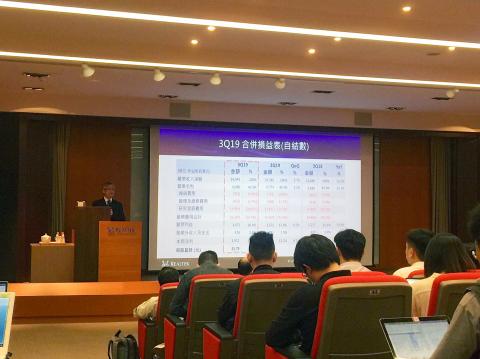Networking chip designer Realtek Semiconductor Corp (瑞昱) yesterday said it posted a net profit of NT$1.92 billion (US$63 million) for last quarter, a 36 percent increase year-on-year and an all-time high, thanks to robust demand for chips used in TVs, Ethernet controllers and PC cameras.
Revenue increased 33 percent to NT$16.04 billion, with PC-related chips contributing 30 percent, slightly higher than the 28 percent in the second quarter.
Earnings per share rose to NT$3.78 last quarter, from NT$2.78 the previous year and NT$3.63 the previous quarter.

Photo: Hung Yu-fang, Taipei Times
Gross margin shrank to 42.9 percent from 44.3 percent in the second quarter and 47 percent in the third quarter last year, as the company shipped more TV chips, which have a gross margin lower than the company average.
The company usually posts its highest revenue in the third quarter of a year, Realtek spokesman Huang Yee-wei (黃依瑋) told a investor conference in Hsinchu.
However, Realtek said it expects revenue to drop mildly sequentially in the fourth quarter as the industry enters its low season and the ongoing US-China trade dispute adds some risks.
“Overall, we are cautiously optimistic about the fourth quarter,” Huang said. “We feel market and customer demand for Realtek products is there, which is a vital factor for Realtek’s operations.”
“The major trends are positive for us,” he said. “No sharp sequential decline is expected in the fourth quarter.”
Demand for chips used in wireless networks and earphones is to increase, while that for lower-margin chips for TVs and PC cameras would lessen following the end of peak season, Huang said.
Realtek is accelerating its exposure to mid and high-end wireless earphones in response to a cutthroat price war in the low-end segment, he said.
“As a growing number of devices are to be connected to the Internet during the 5G era, demand for Realtek’s chips for Internet of Things and WiFi devices should increase accordingly,” he added.

Taiwanese suppliers to Taiwan Semiconductor Manufacturing Co. (TSMC, 台積電) are expected to follow the contract chipmaker’s step to invest in the US, but their relocation may be seven to eight years away, Minister of Economic Affairs J.W. Kuo (郭智輝) said yesterday. When asked by opposition Chinese Nationalist Party (KMT) Legislator Niu Hsu-ting (牛煦庭) in the legislature about growing concerns that TSMC’s huge investments in the US will prompt its suppliers to follow suit, Kuo said based on the chipmaker’s current limited production volume, it is unlikely to lead its supply chain to go there for now. “Unless TSMC completes its planned six

Power supply and electronic components maker Delta Electronics Inc (台達電) yesterday said second-quarter revenue is expected to surpass the first quarter, which rose 30 percent year-on-year to NT$118.92 billion (US$3.71 billion). Revenue this quarter is likely to grow, as US clients have front-loaded orders ahead of US President Donald Trump’s planned tariffs on Taiwanese goods, Delta chairman Ping Cheng (鄭平) said at an earnings conference in Taipei, referring to the 90-day pause in tariff implementation Trump announced on April 9. While situations in the third and fourth quarters remain unclear, “We will not halt our long-term deployments and do not plan to

‘SHORT TERM’: The local currency would likely remain strong in the near term, driven by anticipated US trade pressure, capital inflows and expectations of a US Fed rate cut The US dollar is expected to fall below NT$30 in the near term, as traders anticipate increased pressure from Washington for Taiwan to allow the New Taiwan dollar to appreciate, Cathay United Bank (國泰世華銀行) chief economist Lin Chi-chao (林啟超) said. Following a sharp drop in the greenback against the NT dollar on Friday, Lin told the Central News Agency that the local currency is likely to remain strong in the short term, driven in part by market psychology surrounding anticipated US policy pressure. On Friday, the US dollar fell NT$0.953, or 3.07 percent, closing at NT$31.064 — its lowest level since Jan.

The New Taiwan dollar and Taiwanese stocks surged on signs that trade tensions between the world’s top two economies might start easing and as US tech earnings boosted the outlook of the nation’s semiconductor exports. The NT dollar strengthened as much as 3.8 percent versus the US dollar to 30.815, the biggest intraday gain since January 2011, closing at NT$31.064. The benchmark TAIEX jumped 2.73 percent to outperform the region’s equity gauges. Outlook for global trade improved after China said it is assessing possible trade talks with the US, providing a boost for the nation’s currency and shares. As the NT dollar